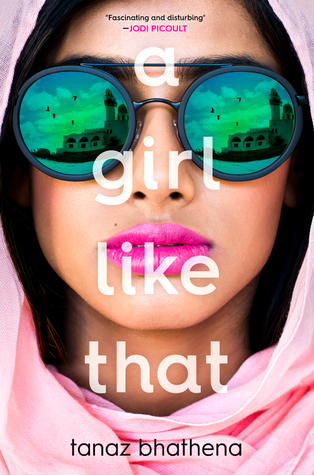
There were a lot of upcoming titles for 2018 with PoC leads that I was highly anticipating, and Tanaz Bhathena's A GIRL LIKE THAT was one of them. All I knew about it was that it was set in Saudi Arabia(!) and featured a female protagonist who was being slut-shamed for not fitting in with cultural norms, despite other much more interesting aspects of her life, like being an Indian Zoroastrian(!), and both a good student and a rebel.
I did not read the summary or the reviews very carefully beforehand, so you can imagine my SHOCK when in the first chapter I find that this is like a BEFORE I FALL set in the Middle East: Zarin and her male friend, Porus, are both dead, standing over their bodies in spirit as their friends, family, and the police examine the wreckage and decide where to place the blame.
The story then goes back and forth in the timeline. We get a better picture of what Zarin was like, and the role her classmates's bullying played in how she ended up. Zarin's parents were both criminals who are now dead, and she lives with an aunt and uncle who only really grudgingly tolerate her presence in their house (her aunt is mentally ill and abuses her physically; her uncle is an enabler who neither seeks his wife help nor gives his niece the protection she needs). Zarin started looking at boys because it made her aunt angry, but after a while it becomes a way to rebel. She chafes at the double-standards in her society that lets men do whatever they want, but dictates that a woman must be held responsible for guarding against unwanted detention. She goes through several boyfriends - two of them are absolute d-bags, the only difference between them is that one plays by society's rules for objectifying women and the other doesn't - and the third loves her and by the end of the story, it's clear that he would do anything for her.
Obviously, this is a very upsetting story and given the beginning, it's pretty obvious that it isn't going to have a happy ending. There are trigger warnings across the board, because the content in this book runs the gamut of rape, domestic abuse, colorism, racism, mental illness, bullying, slut-shaming, rape culture, and some other stuff that I probably forgot. That said, while this is a book I would never say was "fun" and probably won't ever reread (D:). I would recommend it to pretty much any questing teenager I happened across because the messages it sends are so important. Particularly if you're the type of person who reads stories like these, notices the location, and says to him- or herself, "Whew, I'm glad that type of thing doesn't happen here (in "my" country)." Then you have to read this book. Consider it assigned reading on how to be a better human being.
Here's the thing: the objectification of women and the blaming of the victim is not exclusive to certain regions. It is a global epidemic, and while it might be better or worse in certain regions, nobody has it down pat, so in my opinion nobody should read about these issues and walk away feeling smug. We know we live in an unequal society when we hear about a woman who was a victim of sexual assault and one of the first things we ask is, "What was she wearing? What was she doing out late at night?" We know we live in an unfair society when people publish PSAs about how women can avoid being raped when they go out at night - instead of publishing PSAs telling men (or anyone) not to be fucking rapists. We know we live in a society that blames its victims when we hear about bullying incidents and think, "Well, they shouldn't have let it get so bad. They should have reported it to the teacher. Maybe they had something to hide or are doing it for the attention."
The bullying in A GIRL LIKE THAT is really well done in this book - and I could see some critics saying that nothing the girls did was really that bad... but it doesn't have to be. People who are really successful bullies don't have to throw your shoes on the school roof or even do something ridiculous like hire gang members to beat you up (a shockingly common trope in shoujo manga). All they have to do is get inside your head and make you doubt, question, and hate yourself, and you'll do 90% of the work for them. That's exactly what Zarin's classmates did. They didn't say a whole lot, but they made sure to be consistent in what they said, and eventually she almost started to take it for granted. That's how I was bullied in high school, too. They made cruel remarks specially tailored for me, and me alone, and went out of their way to assure me that everything I did, thought, and liked made me worthless. And, like most of Zarin's teachers, mine were complicit. Either they did nothing, or they participated in it themselves, or they enabled it by punishing or shaming me instead of the people who were attacking me. My first two years of high school were a special brand of hell, and I had parents who loved me and tried to draw me out. Zarin had absolutely no one, except for Porus, and my heart absolutely ached for that girl, and for everyone else who feels that alone and helpless.
You should definitely read this book. I'm still shaken by the utter unfairness of the ending.
4 to 4.5 out of 5 stars.
No comments:
Post a Comment
Note: Only a member of this blog may post a comment.